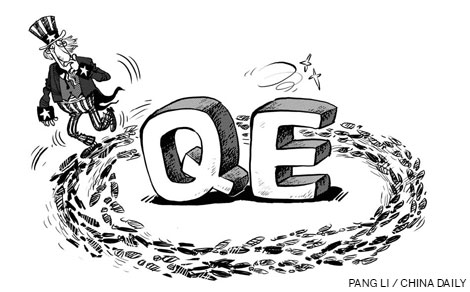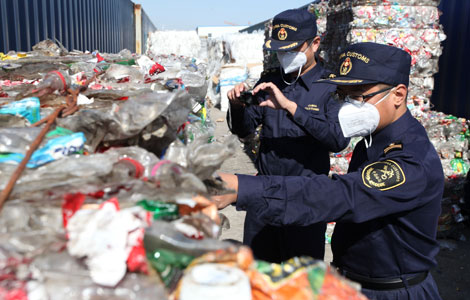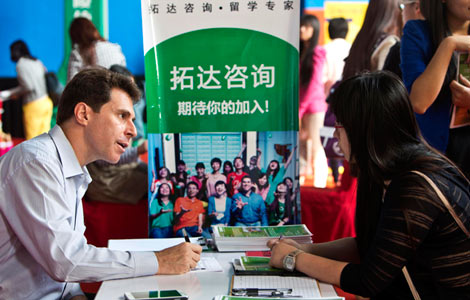Money is too tight to mention
Updated: 2013-10-18 08:12
By Clive McDonnell (China Daily USA)
|
||||||||
Emerging equity markets have risen 5-10 percent since the start of September in a relief rally as US bond yields have declined and expectations of the first increase in the Federal Reserve rate have been deferred to 2015. Nevertheless, because some of these markets are hostage to foreign flows and sentiment, long-term investors are likely to shift asset allocations from markets with weaker fundamentals to those with more robust foundations.
The Fed's surprise decision to postpone the unwinding of its quantitative easing (QE) monetary policy may provide a temporary boost, but it will not change these underlying trends.
From an equity investor's standpoint, financial conditions in Asia tightened considerably during the second quarter of this year as foreign liquidity injections into the monetary base slowed or - in the case of Indonesia - declined. Rather than offsetting this tightness in foreign liquidity, policymakers in India, Indonesia and Turkey have compounded the deterioration in the third quarter by tightening domestic liquidity conditions. These policies have the effect of sacrificing growth to support exchange rates.
While the policies are likely to be belatedly reversed, potentially triggering a turnaround in the outlook of markets, this may not happen soon enough to prevent a slowdown in economic and earnings growth.
Foreign investors are overweight on Indian and Turkish equities, and neutral on Indonesia. Conversely, they are neutral on Indonesian and Turkish bonds. This implies that significant foreign capital may still flow out of India and Turkey, benefiting economically stronger markets including the Philippines, Malaysia and Taiwan.
Policymakers' decisions to tighten domestic liquidity through measures such as raising the cost of borrowing from the central bank (in India and Turkey) and increasing base rates (in Indonesia) is rooted in fears over inflation and the funding of current account deficits.
Standard Chartered's 2014 current account deficit forecasts for Turkey, India and Indonesia are 8 percent, 4 percent and 2 percent of GDP, respectively, and we forecast 7 percent inflation in all the three economies. In all these countries, raising the cost of funding is aimed at attracting foreign capital to fund the current account deficit and shore up the currency to limit imported inflation.
About $36 billion of foreign capital flowed out of emerging economies' equity markets between April and mid-September this year, which has weighed on domestic money and liquidity creation. Byproducts of this slowdown include depreciation pressure on exchange rates and anxiety over the funding of current account deficits.
Policymakers have sought to stabilize exchange rates and attract foreign inflows by offering higher interest rates and implementing administrative measures. These policies have also weighed on domestic money creation and are compounding liquidity tightness.
The question for investors is whether this is the optimal policy mix at a time when the US' policy on QE is changing. In our view, the combination of tighter financial conditions and weak economic fundamentals of emerging-market economies with deficits will resume performing below par once the current QE relief rally ends. While US bond yields are currently falling, the longer-term trend is toward further increase. Standard Chartered forecasts that 10-year Treasury yields for the US will rise to 2.9 percent by the fourth quarter of this year and 3.3 percent by the second quarter of 2014.
The evolution of emerging markets' policy environment is an indication of the outlook on equity markets in the fourth quarter: downside risks remain in Indonesia and Turkey, where policymakers are behind the curve and fundamentals are weak.
India stands out positively thanks to the swift improvement in its trade deficit and the prospect of moves by the Reserve Bank of India (the country's central bank) to ease the liquidity squeeze banks are experiencing. We think that the combination of a general election, likely in 2014, and the current slowdown in the growth rate could lead to a more accommodative policy stance by the RBI. But this will require the value of the Indian rupee to continue to recover and inflation expectations to remain under control.
Indonesia, too, faces elections in 2014. However, in contrast to India, economic policy is unlikely to be a major feature of the election campaign in Indonesia. This may change as growth slows, putting pressure on margins amid elevated inflation. This may restrict the government's ability to raise minimum wages further without undermining investment.
For investors who must remain fully invested during this period of QE transition and tight financial conditions in Asia, we recommend they focus on economies with surplus savings and no dependence on foreign liquidity to balance their books. In Asia, these markets include Taiwan, Malaysia and the Philippines, because all the three have large current account surplus and the flexibility to maintain relatively loose domestic financial conditions.
The author is chief equity strategist at Standard Chartered Bank.

(China Daily USA 10/18/2013 page16)
Most Viewed
Editor's Picks

|

|

|

|

|

|
Today's Top News
China warns of emerging markets' slowing demand
Roche boosted by strong drug sales in US, China
IBM's China-driven slump sparks executive shakeup
US not budging on its arms restrictions on China
Can cranberries catch on in China?
Asia-Pacific pays executives world's highest salaries
US debt deal a temporary fix
China is No 1 oil importer
US Weekly

|

|













